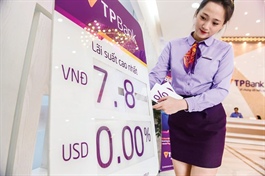Vietnamese banks remain attractive to foreign investors
Vietnamese banks remain attractive to foreign investors
Vietnamese banks are still attractive to foreign investors thanks to the country’s economy and strong resilience to unprecedented difficulties and challenges caused by the COVID-19 pandemic. 
With Fitch Ratings raising the overall outlook for Viet Nam from "Stable" to "Positive", several Vietnamese banks have also been rated positive by the international rating agency. The rating has confirmed the strength of Vietnamese banks in adapting and maintaining stability even amid difficult times.
Despite the difficulties caused by the pandemic, Viet Nam is still considered a bright spot in the global economy. According to a recent analysis, Asian Development Bank assessed that Viet Nam's economy would grow strongly this year at 6.7 per cent and 7 per cent in 2022 despite the resurgence of COVID-19.
Many Vietnamese banks have also become more active in looking for foreign partners with an aim to realise their set goals and strategies.
VPBank in April signed an agreement to sell a 49 per cent stake in FE Credit to Japan’s Sumitomo Mitsui Finance Group (SMFG) in a transaction that values the non-bank lender at US$2.8 billion.
Through this transaction, FE Credit is expected to receive support in capital resources, management capacity and experience in the consumer finance sector in Asia from SMBC Group, especially SMBCCF - a leading consumer finance company in the Japanese market.
At the same time, this transaction will add a large amount of capital to VPBank, contributing to enhancing the bank's financial potential to capture new investment opportunities in the market.
At SHB, to find and select foreign investors who can support and bring the best benefits to the bank as well as its shareholders and customers, the SHB’s general meeting of shareholders recently approved fixing the foreign ownership rate of 10 per cent to find and select strategic partners. The bank also approved the ownership ratio of foreign strategic investors at the bank to be not more than 20 per cent of charter capital.
Nguyen Van Le, General Director of SHB, said there were now several financial groups, banks and large investment funds in the world that wanted to become investors in SHB.
SHB also planned to issue international bonds with a total value of $500 million with a term of 3-5 years. According to Le, for shareholders, the issuance of bonds to the international market not only increases profit margins and adds value to shareholders through the dividend plan, but also contributes to improving the value of each shareholder in the long run.
























